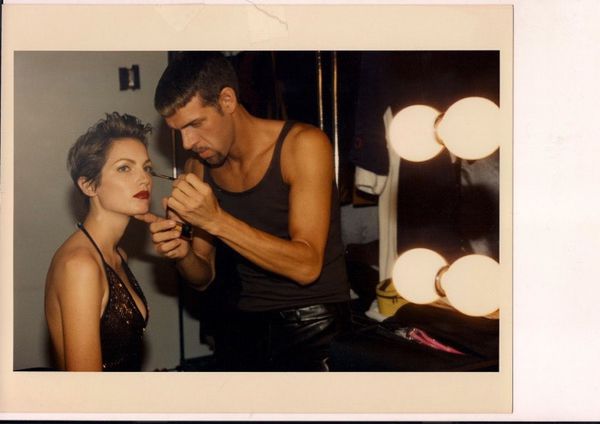Eye For Film >> Movies >> Larger Than Life: The Kevyn Aucoin Story (2017) Film Review
Larger Than Life: The Kevyn Aucoin Story
Reviewed by: Jennie Kermode

If you're not part of the film industry and you don't much follow fashion, you've probably never heard of Kevyn Aucoin. What's almost certain, however, is that you've seen his work, or at least seen work influenced by it. You may even have applied his techniques yourself. Kevyn Aucoin more or less invented modern make-up styling. His innovative approach led to him being in such demand amongst models and, later, musicians and film stars, that he also helped to invent the profession of make-up artist, turning work that had previously been done by the stars themselves into a specialism. Few individuals have had such a visible impact on contemporary culture. This documentary attempts to go behind the scenes and find out more about the man.
Treading the traditional path of the career documentary, it begins by looking at Kevyn's childhood and the factors that led an adopted boy who couldn't fit in to become an industry legend. Childhood friends recount how Kevyn, despite being very noticeably gay very early, couldn't keep his hands off girls because whenever he saw one he wanted to paint her face and arrange her hair. He became very popular because of his ability to make women who had never really thought of themselves as attractive turn heads everywhere they went, saying that he found his greatest pleasure in showing other people their beauty. In the company of a friend who hoped to become a model, he set off for the bright lights of the big city, where his inventiveness and ebullient personality quickly made an impression.

That's the happy part of the story. There were, as always, challenges, including a mysterious health problem, failed relationships and, inevitably, the insecurities that came from facing competition from young make-up artists who had grown up wanting to be him. Fashion is a fickle industry and creating the glamour looks of the Eighties is not enough to trade on for life. Director Tiffany Bartok doesn't shy away from the depressing aspects of Kevyn's story, nor obfuscate his responsibility for parts of what went wrong.
Telling the story is an incredible collection of women Kevyn worked with at one time or another, from those who now regret that they treated him as disposable to those who became true friends. Cher and Isabella Rossellini speak at length; Kate Moss reminisces about the good times; Tori Amos tries to put things in perspective and acknowledge the toughness of remaining emotionally intact in a business that sees people as commodities. Paulina Porizkova remains dazzled by his talent. Bartok also speaks to former boyfriends who recall both his generosity and the inconstancy that came with painkiller addiction. Weaving together all these accounts and more, she creates a narrative tapestry from thick the vital threads emerge slowly, not always obvious to begin with. Even now, it's easy to be distracted by the art and overlook its creator.
If the art is what you're there for, the film does contain scenes you can learn from - there's a lot of archive footage - but there are no simple lessons. The trick, says Kevyn, is to enhance imperfections, to focus not just on the face itself but on drawing out the beauty of the soul. There's a warning there too, a suggestion that he was so enchanted by physical beauty that he sometimes expected more from the soul than was really there, awakening from the dream only to find himself on the cold hill's side.
An exploration of glamour in all its senses, this is a beguiling film which, thankfully, does have substance underneath the surface.
Reviewed on: 29 Jun 2018















